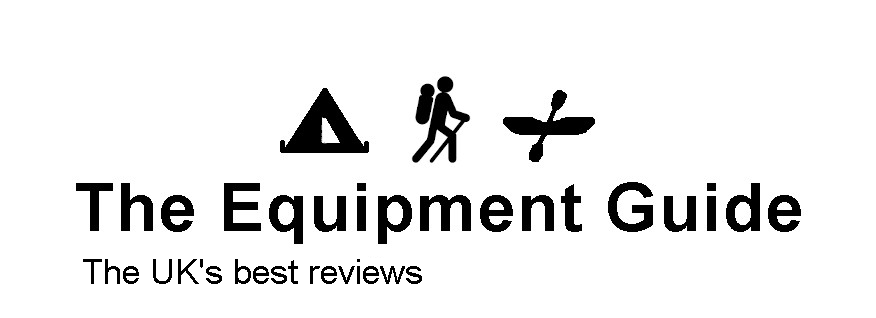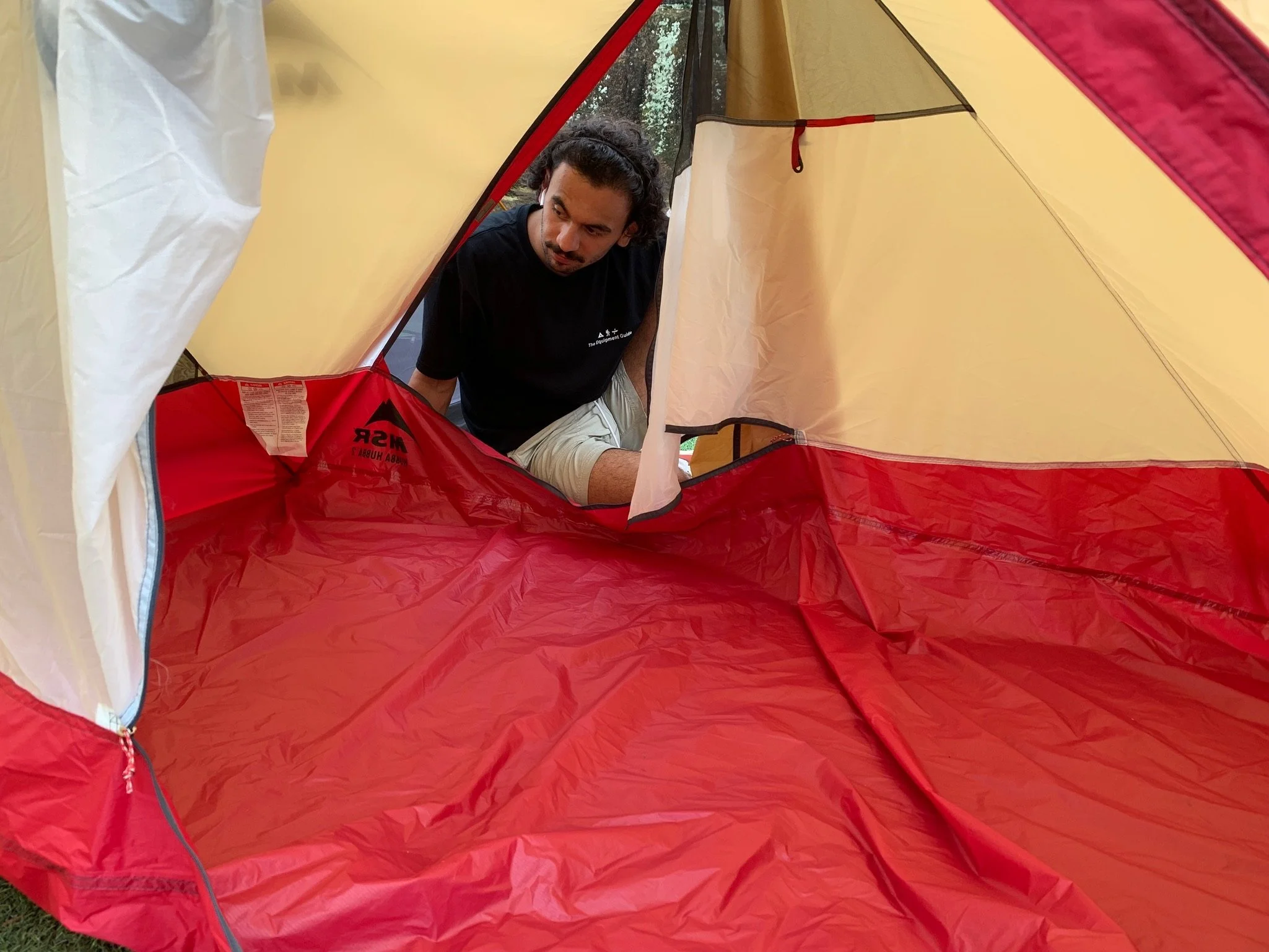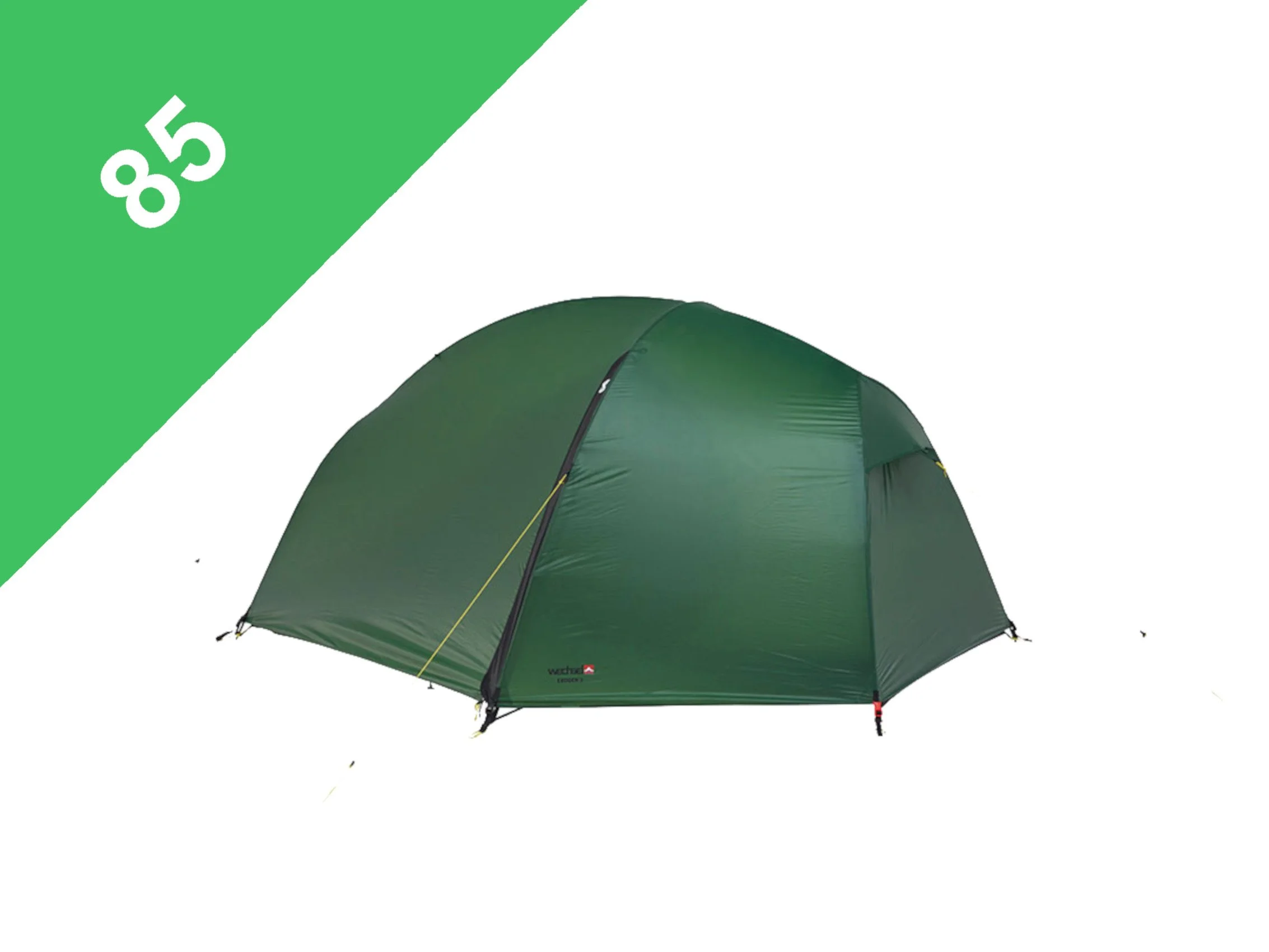Best Backpacking Tent UK 2026
Tested on long-distance trails, mountain ridges and exposed hills in the UK.
Want to know what we think is the best backpacking tent for hiking in the UK? Pick the best backpacking tent for you from our list of clearly ranked and analysed tents. All reviewed tents are 2-person tents, ideal for carrying on your back, and assessed with UK conditions (rain, wind…) in mind. View more details of each key product via the ‘Read Full Review’ buttons below, or watch our video review. Want something a bit more stylish? Check out our list of top teepee tents.
Updated 9th January 2026
Our Top Picks
-

MSR Hubba Hubba NX
-

Kelty Wireless 2
Backpacking Tent Reviews
MSR Hubba Hubba NX
Price At Time Of Writing | £459.99
Overall Rating | 95
Comfort | 9
Construction | 9
Features | 9
Size/Weight | 8
Versatility | 10
Packed Size - 46x15cm
Weight - 1.8kg
Sleeping Size - 2.5sqm
Best For - Versatile all-season backpacking for two
Pros - Spacious and comfortable, relatively lightweight, well-ventilated
Cons - Premium price point
Overall - A reliable and popular all-rounder for most conditions
Nemo Hornet Elite OSMO
Price At Time Of Writing | £619.99
Overall Rating | 94
Comfort | 9
Construction | 9
Features | 9
Size/Weight | 10
Versatility | 7
Packed Size - 48x10x5cm
Weight - 0.936kg
Sleeping Size - 2.5sqm
Best For - Ultralight thru-hikers and fastpackers
Pros - Extremely lightweight, fast, simple pitch
Cons - Cramped interior, high cost, delicate materials
Overall - A top choice when minimizing weight is the absolute priority
Nemo Dragonfly OSMO
Price At Time Of Writing | £349.99
Overall Rating | 93
Comfort | 7
Construction | 9
Features | 9
Size/Weight | 10
Versatility | 8
Packed Size - 50x12cm
Weight - 1.4kg
Sleeping Size - 2.7sqm
Best For - Long-distance backpackers wanting a balance of weight and comfort
Pros - Ultra-lightweight, good interior space for weight
Cons - Expensive, tapered foot area
Overall - An excellent, performance-focused hiking tent
Mont Moondance 2
Price At Time Of Writing | £569.99
Overall Rating | 93
Comfort | 10
Construction | 9
Features | 9
Size/Weight | 7
Versatility | 8
Packed Size - 49x15cm
Weight - 2kg
Sleeping Size - 2.9sqm
Best For - Couples wanting durable comfort for basecamp-style trips
Pros - High-quality materials and build, very spacious
Cons - Significant investment
Overall - A top-tier, roomy tent for longer trips
MSR Access 2
Price At Time Of Writing | £624.75
Overall Rating | 92
Comfort | 8
Construction | 8
Features | 9
Size/Weight | 7
Versatility | 10
Packed Size - 46x15cm
Weight - 1.72kg
Sleeping Size - 2.7sqm
Best For - Winter camping and alpine missions where weight matters
Pros - Strong storm performance, vestibule space
Cons - Bulky pack size for the price
Overall - A versatile and capable lightweight 4-season shelter
Lightwave Sigma S22
Price At Time Of Writing | £699.00
Overall Rating | 90
Comfort | 9
Construction | 9
Features | 7
Size/Weight | 8
Versatility | 7
Packed Size - 45x18cm
Weight - 1.5kg
Sleeping Size - 3sqm
Best For - Hikers looking for a simple, stormworthy single-wall shelter
Pros - Lightweight for its strength, roomy interior, excellent waterproofing
Cons - Can feel dark inside, pole threading required for pitch
Overall - A great, lightweight single-wall option
Hilleberg Rogen 2
Price At Time Of Writing | £1,198.99
Overall Rating | 90
Comfort | 8
Construction | 9
Features | 8
Size/Weight | 7
Versatility | 8
Packed Size - 46x15cm
Weight - 2.2kg
Sleeping Size - 2.8sqm
Best For - Expeditions and severe weather conditions where strength is critical
Pros - Extremely sturdy, weather-resistant, spacious, freestanding
Cons - Can be stuffy in warm weather, heavy for backpacking, inner-first pitch
Overall - A bomber shelter worth the investment for demanding use
MSR Elixir 2
Price At Time Of Writing | £305.99
Overall Rating | 88
Comfort | 8
Construction | 8
Features | 9
Size/Weight | 5
Versatility | 8
Packed Size - 51x17cm
Weight - 2.7kg
Sleeping Size - 2.69sqm
Best For - Beginner backpackers and car campers wanting durable comfort
Pros - User-friendly features, durable construction, good value
Cons - Heavier and bulkier than ultralight options
Overall - A comfortable and versatile shelter that’s liveable rather than light
Big Agnes Copper Spur HV UL-2
Price At Time Of Writing | £425.00
Overall Rating | 85
Comfort | 7
Construction | 8
Features | 8
Size/Weight | 7
Versatility | 5
Packed Size - 50x15cm
Weight - 1.4kg
Sleeping Size - 2.69sqm
Best For - Couples wanting a best-in-class balance of weight and space
Pros - Lightweight, generous headroom, well-designed pockets
Cons - Asymmetrical design can feel uneven for two
Overall - A quality, high-performance 3-season tent for weight-conscious duos
Marmot Tungsten 2P
Price At Time Of Writing | £269.74
Overall Rating | 85
Comfort | 8
Construction | 7
Features | 8
Size/Weight | 6
Versatility | 6
Packed Size - 54x18cm
Weight - 2.4kg
Sleeping Size - 3sqm
Best For - Weekend backpacking and festival camping on a budget
Pros - Very spacious interior for the price, easy to pitch
Cons - Too heavy and bulky for long-distance hiking
Overall - A great value tent for shorter trips where weight isn't the main concern
Wecshel Exogen 2
Price At Time Of Writing | £489.99
Overall Rating | 85
Comfort | 7
Construction | 7
Features | 8
Size/Weight | 7
Versatility | 6
Packed Size - 55x19cm
Weight - 1.93kg
Sleeping Size - N/A
Best For - Hikers wanting Hilleberg-level storm protection at a lower price
Pros - Excellent weather resistance, robust, freestanding
Cons - Limited ventilation, heavier than ultralight tents
Overall - A reliable, four-season-capable tent for challenging environments
Big Agnes Tiger Wall UL2 Solution Dye
Price At Time Of Writing | £373.90
Overall Rating | 84
Comfort | 7
Construction | 6
Features | 7
Size/Weight | 8
Versatility | 6
Packed Size - 46x14cm
Weight - 1.13kg
Sleeping Size - 2.6sqm
Best For - Ultralight thru-hikers focused on minimising pack weight
Pros - Lightweight, excellent airflow, eco-conscious materials
Cons - Snug for two, requires careful handling, small vestibules
Overall - A great, minimalist shelter for careful backpackers in fair conditions
Kelty Wireless 2
Price At Time Of Writing | £94.95
Overall Rating | 80
Comfort | 7
Construction | 6
Features | 7
Size/Weight | 5
Versatility | 5
Packed Size - 56x15cm
Weight - 3.31kg
Sleeping Size - 2.7sqm
Best For - Casual car camping and occasional short backpacking trips
Pros - Roomy, comfortable, very durable floor and fabric
Cons - Heavy, ventilation can lead to condensation
Overall - A reliable and affordable shelter for general outdoor use
Naturehike Cloud-Up 2
Price At Time Of Writing | £149.00
Overall Rating | 73
Comfort | 5
Construction | 3
Features | 4
Size/Weight | 8
Versatility | 3
Packed Size - 40x13cm
Weight - 1.8kg
Sleeping Size - 2.6sqm
Best For - Solo hikers or budget-conscious couples on short adventures
Pros - Very low price, reasonably lightweight for the cost
Cons - Cramped interior, minimal interior storage pockets
Overall - A functional budget option where space and features are secondary to price
Vango Nevis 200
Price At Time Of Writing | £140.00
Overall Rating | 72
Comfort | 2
Construction | 5
Features | 5
Size/Weight | 7
Versatility | 3
Packed Size - 46x15cm
Weight - 2.0kg
Sleeping Size - 2.6sqm
Best For - Occasional fair-weather use by solo campers on a tight budget
Pros - Cheap
Cons - Cramped and dark interior, awkward pitch, poor ventilation
Overall - A very basic shelter suitable only for minimal use in good conditions
Kelty Late Start
Price At Time Of Writing | £119.99
Overall Rating | 70
Comfort | 4
Construction | 3
Features | 3
Size/Weight | 7
Versatility | 3
Packed Size - 41x18cm
Weight - 2.4kg
Sleeping Size - 2.7sqm
Best For - First-time campers or festival-goers needing simple setup
Pros - Extremely easy and fast to pitch, affordable price point
Cons - Single door is inconvenient for two, materials feel basic
Overall - A no-frills, entry-level tent for low-impact camping
Watch our video review to learn what to look for in a backpacking tent
Watch our video review to learn what to look for in a backpacking tent
Advice We’d Give to A Friend
The Basics
How important is weight? - Weight contributes to the overall backpacking experience, but it is not the defining feature one should look for. Weight can often be reduced by sacrificing sleeping size or material quality, but the best available backpacking tents manage to find a happy medium. We have found that around 2kg is an ideal weight for a combination of quality and comfort.
How many season tents do I need? - It depends on when you want to go camping. A 3-season tent is best for warmer months in the UK, while a 4-season tent will stand up to harsher weather (get outside in Winter!). It is worth noting that 4-season tents trap the heat, so can get quite warm during summer. Essentially, these tent categories will help you identify what you need, depending on your activity.
Are backpacking tents easy to set up? - Yes, backpacking tents are built for ease of use. Most of the models we tested take only a couple of minutes to set up. The best backpacking tents for hiking are cleverly designed with instant pop-up features.
What features are important? - We prefer having double vestibules for extra storage for camping gear. Aside from that, single or double pole setup and at least 2 internal pockets definitely make a for more convenient use. Weight, durability, and a comfortable sleeping space are obviously the other key features for the best backpacking tents in the UK.
Budget
You can definitely get a decent 2 person backpacking tent for hiking without dropping a ton of cash. For a more detailed comparison, we can break the market into three budget categories:
Over £400 - This will give you the best lightweight backpacking tents.
£100 to £400 - Tents sold in this price range are still great and slightly different to high-end models. They are fairly priced given their similar quality to the ones over £400.
Under £100 - These tents are typically cramped or made from cheap materials that can fall apart over time. We suggest investing a bit more for the better options.
Purpose of Use
Think about how you will use your tent. Are you using it for backpacking/hiking or camping as well? Consider these questions when choosing a tent, whether it is solely for one activity or something more versatile. For instance, if you’re planning on using it often for car camping rather than backpacking, you may be willing to get a heavier tent that offers a larger sleeping space.
UK-Specific Considerations
Backpacking in the UK comes with its own quirks, so here are a few things worth thinking about before you pick a tent:
Rain is a given - Even in summer, showers are common across the UK, so water resistance is a must. Look for tents with a hydrostatic head (HH) rating of at least 3,000mm for the flysheet and around 5,000mm for the groundsheet if you want to stay dry during those inevitable downpours. Good seam sealing and a strong bathtub floor make a real difference in soggy conditions.
Wind resistance matters - Whether it’s the Scottish Highlands or coastal Wales, gusts can be strong. A tent with a solid pole structure (cross-pole or geodesic design) and strong guy lines will hold up much better than a budget pop-up. Lightweight is great, but not at the expense of stability when the wind whips up on an exposed ridge.
Condensation is a real issue - Cool nights and damp air mean condensation build-up inside tents is common. Double-wall tents with good ventilation (mesh panels, adjustable vents) really help here. It’s worth grabbing something with good ventilation over shaving a few grams off your pack weight.
Pitching on wet or uneven ground - UK wild camping spots often mean boggy patches, rocky soil, or lumpy grass, so a smaller footprint tent is often easier to pitch in awkward spaces.
Wild camping laws and access - In Scotland, wild camping is broadly allowed if you follow the Scottish Outdoor Access Code. In England and Wales, it’s a different story, as wild camping is only legal in a few areas (like Dartmoor’s designated spots) and elsewhere you need landowner permission.
Storage and packability - Since UK backpacking often involves trains, buses, or smaller cars to get to trailheads, pack size matters just as much as weight. A tent that packs down small enough to fit inside your rucksack, rather than strapping it awkwardly on the outside, makes travel a lot smoother.
Local warranty and support - UK retailers like Cotswold Outdoor, Go Outdoors, or Ellis Brigham often stock major tent brands and can help with warranty claims or spare parts. This can save a lot of hassle compared to dealing with overseas-only support.
Safety Checklist
Check weather and flood warnings - The UK can throw all sorts at you in a day. Always check the Met Office for up-to-date weather warnings and Environment Agency for flood alerts before heading out. A sudden storm or heavy rain can turn a nice valley walk into a risky situation.
Plan your route and check local advisories - Footpaths and trails in the UK sometimes close due to erosion, wildlife protection, or local hazards. Sites like National Trails and Scottish Outdoor Access Code are great for checking any trail restrictions or updates.
Tell someone where you’re going - Whether it’s a quick overnight in the Lakes or a week on the West Highland Way, let a friend or family member know your route and when you expect to be back. It’s simple, but it can make all the difference if the weather turns or you get delayed.
Ratings By Category
Method
We selected the top backpacking tents in each category after evaluating the tents currently on the market and each tent instantly earned 50 points just for being chosen. In order to rank them out of 10 in the following categories — Comfort, Construction, Features, Size/Weight and Versatility — we conducted field tests and in-person evaluations.
Rankings are modified or weighted according to their significance and degree of variation, for example, certain categories will be rated from 1 to 10, while others will be rated from 4 to 9, etc. However, there are occasionally outliers. We have done our best to accurately depict how each tent ranks overall and why.
Here, we strive to give you all the information you need to find the best backpacking tent in the UK. At The Equipment Guide, we believe that thorough reviews of backpacking tents should provide you all the information you need to choose one.
Comfort
Comfort considers the size of the sleeping area, which includes these three key components: floorspace, headroom and design layout.
There can be quite a bit of difference in this area. The Vango Nevis 200, for instance, has so little room that two people must lie head to toe. The Naturehike Cloud-Up 2 tent has a design that has sloped walls, which reduces the already cramped space. For that reason, we wouldn’t buy either of those. In the mid-range and best backpacking tents in the UK, there isn’t a great deal of variation, though. For instance, the Big Agnes Copper Spur HV UL-2 has less room at the feet as it tapers in, but this is a fairly minor comfort negative. In our view, a spacious, symmetrical space is better, but it is not the be all and end all.
The interior of the Vango Nevis 200 is a bit cramped
MSR Hubba Hubba NX has a comfortable space
Construction
Construction primarily considers the quality of the workmanship and the materials. The fabrics and pole materials have a significant impact on the durability. Here, weight, quality and price are typically trade-offs.
Strong aluminium poles are important, as fibreglass tends to snap, which is the last thing you want when you are in the middle of the bush. Ripstop waterproof materials with a decent PU (1200+) are also going to keep you dry and will be strong. These are probably the main things we suggest looking out for when looking for the best hiking tents. Some of the best hiking tents have thicker gauge poles, a higher denier (density) fabric with great waterproofing, like the MSR Hubba Hubba NX or better cinch straps, which can help with durability. On the flip side, budget models such as the Naturehike Cloud-Up 2 or Vango Nevis 200 have some of these features, but the design and layout of their poles make the overall structure weak.
The Vango Nevis 200 is made from cheaper materials
Look for strong aluminium poles rather than fibreglass
Features
The more aesthetically pleasing aspects of liveability, such as the number of vestibules, privacy screens, pockets and ease of setup, are taken into consideration in ‘Features’.
Given that these are a 2-person tents, double vestibules are crucial features to look for as they provide extra room for each person to stow their hiking pack or other goods. Having a single-pole arrangement and a few pockets to store a headlamp or other items you want nearby are also helpful. Also useful are privacy screens. The majority of these features are included in all of the mid- to high-range hiking tents we tested. The Vango Nevis 200 was a bit challenging to set up, and the Naturehike Cloud-Up 2 has one very narrow vestibule and is light on features.
The MSR Hubba Hubba NX has plenty of ventiliation
The Vango Nevis 200 has no windows and only has a single vestibule
Size/Weight
Size/weight consider both the kilogramme weight and the packed size, or how much space it will occupy in your bag.
The Nemo Dragonfly is the clear standout here. At only 1.4kg, it’s the best in terms of being a lightweight hiking tent if you are looking for something to use purely for hiking. Of the mid- to high-range tents, the Big Agnes Copper Spur HV UL-2 is also great at 1.4kg, but packs slightly larger than the Nemo Dragonfly. The Naturehike Cloud-Up 2 is lightweight, but it’s important to note that it does this to the detriment of quality in other areas. The Kelty Wireless 2 is the heaviest tent we reviewed at 3.31kg. The best lightweight hiking tents don’t sacrifice weight for quality.
Marmot Tungsten vs Nemo Hornet Elite OSMO pack size
Versatility
Whether we would use the tent for day hikes, multi-day hikes or merely camping is considered in this category. A capable all-arounder can perform all three.
With a spacious interior and lightweight package, the MSR Hubba Hubba NX is a great all-rounder that can be used for anything. While expensive, the MSR Access 2 is another good, versatile option with plenty of headroom. The Lightwave Sigma S22 is also expensive, but has a large sleeping size and is waterproof and light for multi-day hiking trips, while the Nemo Dragonfly is an excellent pure hiking tent. There are small differences between the top brands, as you can see from the below images.
The MSR Hubba Hubba NX has mesh on the top for you to gaze at the stars in warm weather
The Nemo Hornet Elite has room for rainy days and windows for ventilation
Overall Ratings
About Our Testing Process
Here at The Equipment Guide we write reviews for the UK with the goal of providing genuine personal assessments of the best products on the market. We do detailed research including field tests to make an informed judgment and help you get a better understanding of what is out there.
All products are reviewed and ranked in a methodical and careful manner and we assess them on relevant key features. We do not accept free products from manufacturers.
Our mission is simple: To create the UK’s best outdoor gear reviews.
Afterword
We hope our reviews have helped you pick from the best lightweight backpacking tents in the UK!
The main takeaway is that there is a tent fit for every purpose and budget. You’ll certainly find one among our reviews. If you have any feedback or product suggestions, feel free to drop us a note.
If you happen to buy one of the tents we’ve recommended, do share some pics with us - we’d love to see you in action!
